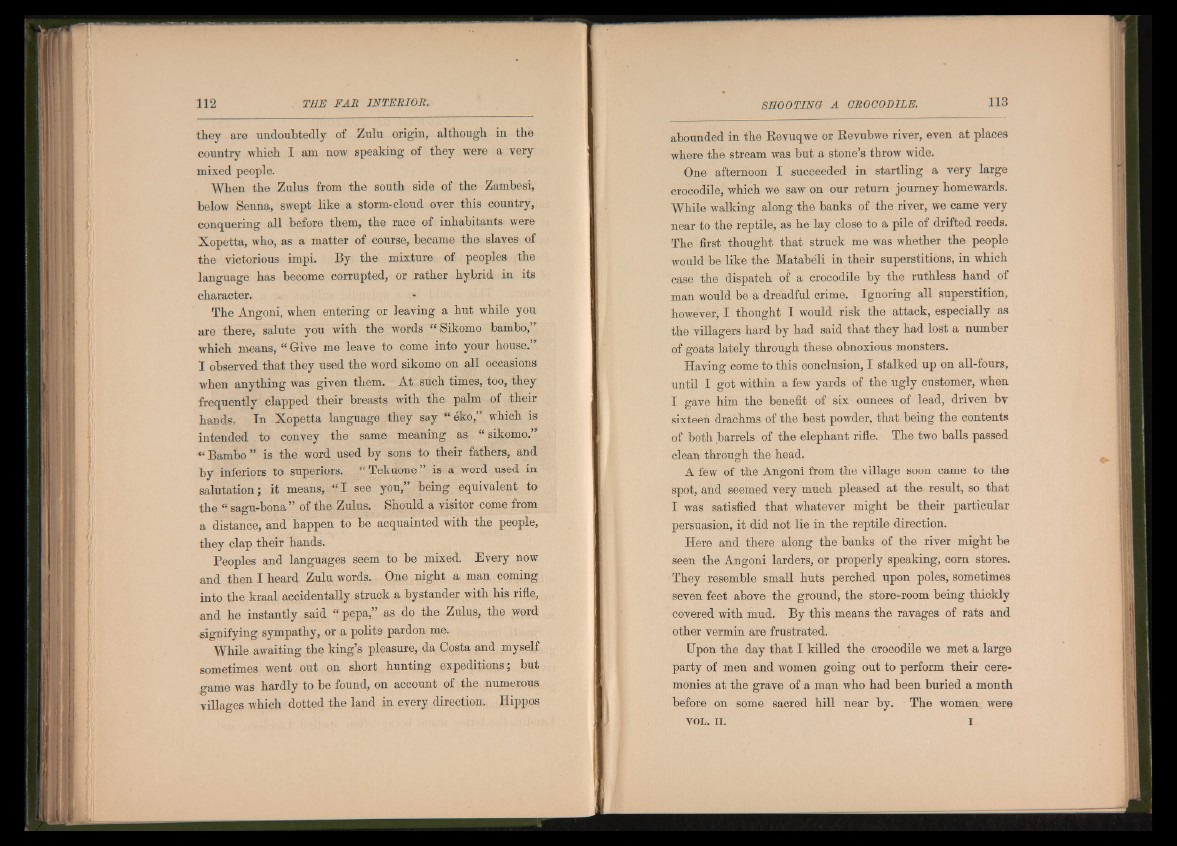
they are undoubtedly of Zulu origin, although in the
country which I am now speaking of they were a very
mixed people.
When the Zulus from the south side of the Zambesi,
below Senna, swept like a storm-cloud over this country,
conquering all before them, the race of inhabitants were
Xopetta, who, as a matter of course, became the slaves of
the victorious impi. By the mixture of peoples the
language has become corrupted, or rather hybrid in its
character.
The Angoni, when entering or leaving a hut while you
are there, salute you with the words “ Sikomo bambo,”
which means, “ Give me leave to come into your house.”'.
I observed that they used the word sikomo on all occasions
when anything was given them. At such times, too, they
frequently clapped their breasts with the palm of their
hands. In Xopetta language they say “ eko,” which is
intended to convey the same meaning as “ sikomo.”
“ Bambo” is the word used by sons to their fathers, and
by inferiors to superiors. “ Tekuone” is a word used in
salutation; it means, “ I see you,” being equivalent to
the “ sagu-bona ” of the Zulus. Should a visitor come from
a distance, and happen to be acquainted with the people,
they clap their hands.
Peoples and languages seem to be mixed. Every now
and then I heard Zulu words. One night a man coming
into the kraal accidentally struck a bystander with his rifle,
and he instantly said “ pepa,” as do the Zulus, the word
■signifying sympathy, or a polite pardon me.
While awaiting the king’s pleasure, da Costa and myself
sometimes went out on short hunting expeditions; but
game was hardly to be found, on account of the numerous
villages which dotted the land in every direction. Hippos
abounded in the Eevuqwe or Eevubwe river, even at places
where the stream was but a stone’s throw wide.
One afternoon I succeeded in startling a very large
crocodile, which we saw on our return journey homewards.
While walking along the banks of the river, we came very
near to the reptile, as he lay close to a pile of drifted reeds.
The first thought that struck me was whether the people
would be like the Matabéli in their superstitions, in which
case the dispatch of a crocodile by the ruthless hand of
man would be a dreadful crime. Ignoring all superstition,
however, I thought I would risk the attack, especially as
the villagers hard by had said that they had lost a number
of goats lately through these obnoxious monsters.
Having come to this conclusion, I stalked up on all-fours,
until I got within a few yards of the ugly customer, when
I gave bim the benefit of six ounces of lead, driven by
sixteen drachms of the best powder, that being the contents
of both barrels of the elephant rifle. The two balls passed
clean through the head.
A few of the Angoni from the village soon came to the
spot, and seemed very much pleased at the result, so that
I was satisfied that whatever might be their particular
persuasion, it did not lie in the reptile direction.
Here and there along the banks of the river might be
seen the Angoni larders, or properly speaking, corn stores.
They resemble small huts perched upon poles, sometimes
seven feet above the ground, the store-room being thickly
covered with mud. By this means the ravages of rats and
other vermin are frustrated.
Upon the day that I killed the crocodile we met a large
party of men and women going out to perform their ceremonies
at the grave of a man who had been buried a month
before on some sacred hill near by. The women were
VOL. II. I